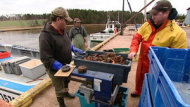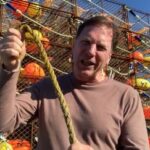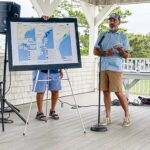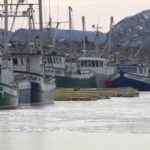Daily Archives: March 14, 2013
U.S. Fish Stocks Rebound From Depletion
Nearly two-thirds of once depleted U.S. fish stocks, including monkfish and sea scallops, are now thriving or bouncing back, a report today says. continue
A Historian’s Perspective on Cod Fishing’s Drastic Downturn – : Christine Buckley
![]() Matthew McKenzie calls Dec. 20, 2012 the unqualified worst day of his professional life. Ironically, it was made so horrible because two groups of people who rarely if ever agree – fishermen from Maine, Massachusetts, and Connecticut and biologists who study these New England waters – were in total agreement. continue
Matthew McKenzie calls Dec. 20, 2012 the unqualified worst day of his professional life. Ironically, it was made so horrible because two groups of people who rarely if ever agree – fishermen from Maine, Massachusetts, and Connecticut and biologists who study these New England waters – were in total agreement. continue
Tampering with our Future – Genetically engineered fish, the FDA and labeling GE/GMO foods, By Anne Mosness
The thought of experimenting with animals to create new life forms that can be patented, produced in commercial feedlots, and marketed without labeling makes most people very uneasy.,,, Consumers need to be aware that U.S. food policies are undergoing huge changes and if they have concerns, they need to contact their legislators, members of Congress and the Food and Drug Administration. The potential for negative impacts on human health, the environment, traditional food producers and businesses make transparency, safeguards and regulations very important. continue
Consumers need to be aware that U.S. food policies are undergoing huge changes and if they have concerns, they need to contact their legislators, members of Congress and the Food and Drug Administration. The potential for negative impacts on human health, the environment, traditional food producers and businesses make transparency, safeguards and regulations very important. continue
The Fisheries Broadcast with John Furlong
Meeting for crab fishermen in the under 40 fleet in Conception Bay,(ground fishing is better than ever), It’s not always easy to find a crew for your fishing boat, and previous broadcasts. Opens in a new window , so you can listen while you browse.
, so you can listen while you browse.
ANALYSIS: NY Times Blog Post Misleads Readers on New England Habitat Closed Area Changes
 WASHINGTON (Saving Seafood) 13 March 2012 — The New York Times, in a recent blog post, fails to accurately describe the original rationale of the New England / Georges Bank closed areas, and does little to explain the credible science backing the New England Fishery Management Council’s decision-making. Many of the closed areas in question don’t actually protect marine habitats, because they were never designed to do so. Instead, they’re the vestiges of a phased-out system of management that limited fishing effort, and are redundant under current regulations. continue
WASHINGTON (Saving Seafood) 13 March 2012 — The New York Times, in a recent blog post, fails to accurately describe the original rationale of the New England / Georges Bank closed areas, and does little to explain the credible science backing the New England Fishery Management Council’s decision-making. Many of the closed areas in question don’t actually protect marine habitats, because they were never designed to do so. Instead, they’re the vestiges of a phased-out system of management that limited fishing effort, and are redundant under current regulations. continue
‘Dirty Blizzard’ in Gulf May Account for Missing Deepwater Horizon Oil
![]() TALLAHASSEE, Fla. — Oil from the 2010 Deepwater Horizon spill acted as a catalyst for plankton and other surface materials to clump together and fall to the sea floor in a massive sedimentation event that researchers are calling a “dirty blizzard.” continue
TALLAHASSEE, Fla. — Oil from the 2010 Deepwater Horizon spill acted as a catalyst for plankton and other surface materials to clump together and fall to the sea floor in a massive sedimentation event that researchers are calling a “dirty blizzard.” continue
Proposed Management Measures for Atlantic Sea Scallop Fishery for 2013
Rep. Frank Pallone, Jr Questions NOAA Official on Fisheries Management: Challenges Administration on Its Data Collection Program and Economic Impacts on Fishing Communities
The hearing comes on top of concerns raised by recreational and commercial fishermen that the Magnuson Act is being implemented with faulty data and a lack of necessary scientific information on fish stocks. The hearing also raised issues of the economic impact that the current federal regulatory regime for fisheries management has on fishing communities. continue
Pot cod season not as good as in past years
![]() Alaska Department of Fish and Game Homer area management biologist Jan Rumble confirmed last week what fishermen have been saying all season: It has been a lousy pot cod season. “It’s going slower than it has in the past,” Rumble said. continue
Alaska Department of Fish and Game Homer area management biologist Jan Rumble confirmed last week what fishermen have been saying all season: It has been a lousy pot cod season. “It’s going slower than it has in the past,” Rumble said. continue
Cuts likely for lower Columbia River fall chinook fishing
 State, federal and tribal officials — plus all manner of commercial and sport fishing interests — are in the middle of the month-long process leading to the setting of summer and fall salmon fishing seasons and regulations. continue
State, federal and tribal officials — plus all manner of commercial and sport fishing interests — are in the middle of the month-long process leading to the setting of summer and fall salmon fishing seasons and regulations. continue
CONSERVATION LAW FOUNDATION: Saving Seafood is “rather discomposed” Really?!!!
The Conservation Law Foundation’s Sean Cosgrove responds to our analysis of their criticism of NEFMC Council Member Laura Ramsden and their arguments on proposed changes to closed areas. 13 March 2013 “It is difficult to get a m an to understand something, when his salary depends on his not understanding it.” – Upton Sinclair continue
an to understand something, when his salary depends on his not understanding it.” – Upton Sinclair continue
Note Saving Seafood has been more than generous providing space for the ENGO agenda. They have always been accurate in their analysis, unlike the pampered poodles of the ENGO crowd. Sean Cosgrove should be absolutely ashamed of himself for quoting Upton Sinclair, especially if he understands the quote, and avoids looking in the mirror!
Alaska Shell game: state scallop fishery faces scrutiny
 A bill extending the limited entry program for scallops is making its way through the Alaska State Senate, but not without scrutiny. The concerns have arisen because a small group of partners from Washington led by Jim Stone of Lakewood have come to control virtually the entire scallop harvest valued at about $4.5 million in 2012. Including American Seafoods, that core group now controls six of nine state and federal permits for the scallop fishery along with the F/V Ocean Hunter, one of the two vessels that still fish in state waters. Since 2009, the Ocean Hunter has harvested scallops in state waters on behalf of the Alaska Scallop Association members with “lease fees” paid to the permit holders who do not associate their permits with a vessel. continue
A bill extending the limited entry program for scallops is making its way through the Alaska State Senate, but not without scrutiny. The concerns have arisen because a small group of partners from Washington led by Jim Stone of Lakewood have come to control virtually the entire scallop harvest valued at about $4.5 million in 2012. Including American Seafoods, that core group now controls six of nine state and federal permits for the scallop fishery along with the F/V Ocean Hunter, one of the two vessels that still fish in state waters. Since 2009, the Ocean Hunter has harvested scallops in state waters on behalf of the Alaska Scallop Association members with “lease fees” paid to the permit holders who do not associate their permits with a vessel. continue
Maine lobster picks up advantage over Maritimes
![]() Maine’s lobster industry is expected to have some advantage over the Maritime’s this coming season with its new environmentally-sustainable certification. continue
Maine’s lobster industry is expected to have some advantage over the Maritime’s this coming season with its new environmentally-sustainable certification. continue
Atlantic lobster fisheries eye sustainable approval
The Maine lobster fishery has outpaced almost all of its counterparts in Atlantic Canada when it comes to a new certification for sustainable catches, says the executive director of the Lobster Council of Canada. continue
David Sikes: Seagrass protection still a hot topic in state legislature
![]() CORPUS CHRISTI — State Rep. Geanie Morrison of Victoria filed legislation this past week that would outlaw the uprooting of seagrass throughout the entire Texas coast. continue
CORPUS CHRISTI — State Rep. Geanie Morrison of Victoria filed legislation this past week that would outlaw the uprooting of seagrass throughout the entire Texas coast. continue
Baltimore crab houses haven’t any crabs
The crabs aren’t coming in. The problem is on the supply side. The Maryland crab harvest doesn’t begin until April 1, and the supply from the winter harvest from the Gulf of Mexico has dwindled. continue
Tierney, Markey split on Magnuson-Stevens Act fishing rules
![]() But among three Massachusetts congressmen — including the ranking Democrat on the committee, Rep. Ed Markey — there was no consensus on the need for a rewrite of the law to give the National Oceanic and Atmospheric Administration more flexibility in writing rebuilding plans for overfished species. continue
But among three Massachusetts congressmen — including the ranking Democrat on the committee, Rep. Ed Markey — there was no consensus on the need for a rewrite of the law to give the National Oceanic and Atmospheric Administration more flexibility in writing rebuilding plans for overfished species. continue













































